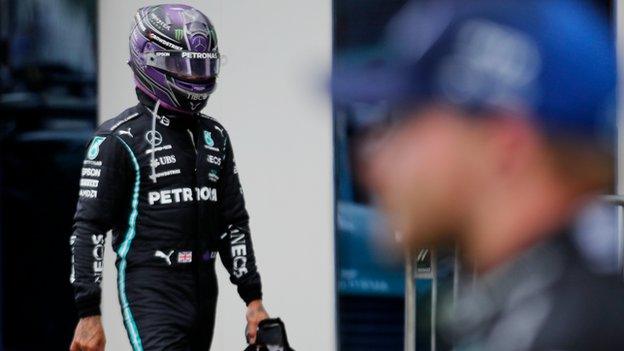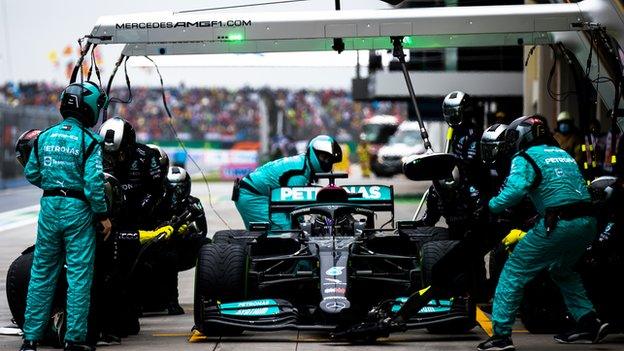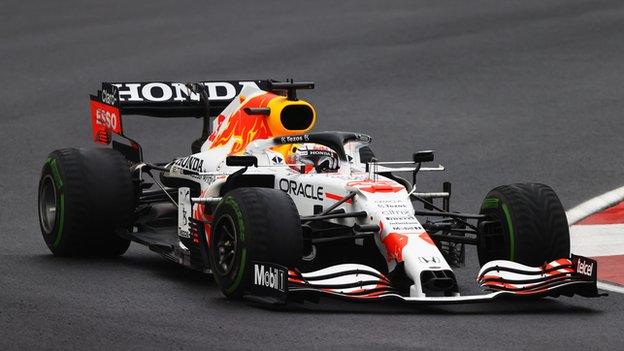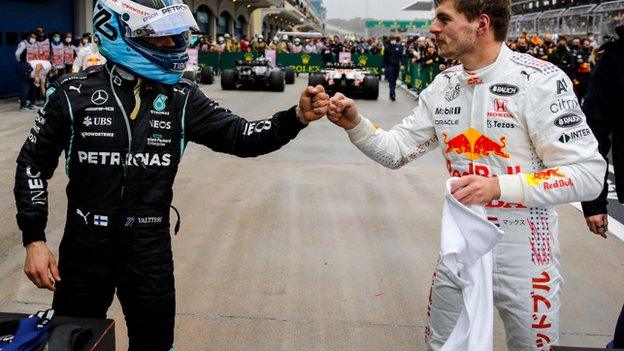Turkish Grand Prix: Should Lewis Hamilton have stayed out?
- Published

Lewis Hamilton walks away at the Turkish Grand Prix
Scenting the chance of an improbable podium or even a win, Lewis Hamilton over-ruled his Mercedes team a number of times as they pondered the difficult call of whether and when to change tyres during the Turkish Grand Prix.
Hamilton had started 11th after a grid penalty, but with 15 laps to go he was up to fourth place and could see his title rival Max Verstappen in front of him.
The Dutchman had already made a pit stop for a fresh set of treaded intermediate tyres on a track that was resolutely refusing to dry and Hamilton, despite his more worn tyres, was keeping pace with the Red Bull.
In the circumstances, it was no wonder Hamilton rejected his team's request to pit. The call, as he put it, "was a risk either way".
If he stayed out, his tyres might hold on long enough for him to finish on the podium. Or, if the track dried quickly enough and everyone had to stop for dry-weather tyres, there was even the distant chance of victory.
On the other hand, if he did not change his tyres, they might dramatically lose grip and he could tumble down the order to sixth or even seventh spot. Or a tyre might explode and force his retirement - the worst possible scenario.
But if Hamilton did pit, he would certainly drop to fifth. There would be the chance of finishing fourth or perhaps even third, but the moves would have to be made on track.
"If I had stayed out," Hamilton said, "you don't know if I would have held position, but I am a risk taker so I would have wanted to take the risk. It's hard to want to give something up when you don't fully know the whole picture."
It was a point he reiterated in a social media post, external on Monday, one in which he also rejected claims that he was "furious" with his team.
Mercedes let him have his way for a while. But in the end they did call him in. Fifth is where he ended up, losing eight points to Verstappen, who now leads one of the tightest championship fights for years by six points with six races to go.

Hamilton made up six places after starting 11th but lost his championship lead
A gamble not tried for 24 years
Who was right? Should Hamilton have stayed out to the end, gambled that his tyres would stay together and he could hold on to third? Or should he have listened to the team and stopped when they first asked him to, 10 laps before he actually did?
Even looking back at the race, it is hard to be sure what the correct answer is.
To give some context to Hamilton's desire to stay out, no driver has completed a grand prix without changing tyres since Mika Salo took fifth place for Tyrrell at Monaco in 1997.
It's just not a thing that you do in modern F1, since pit stops were re-introduced in 1982 by Brabham and became de rigueur the following year.
But that doesn't necessarily make it the wrong thing to try.
In hindsight, the right time to stop for tyres was with just over 20 laps to go, when Red Bull called in Verstappen and team-mate Sergio Perez, and Mercedes stopped Valtteri Bottas when leading.
When Perez pitted on lap 37, he was fighting to hold off Hamilton for fourth place. The stops by Bottas and Verstappen brought them back towards the seven-time champion and handed the lead to Ferrari's Charles Leclerc, who had run a strong third from the start.
Heading into the last 18 laps, the top four were covered by just 15 seconds. Hamilton could see Verstappen just three seconds in front of him and both lapping at around the same pace - and he and Leclerc were thinking of staying out to the end.
So, when Mercedes first called Hamilton in for tyres, it is no wonder he refused.
At that time, Mercedes were happy to leave him out, realising the potential upside was big. But within a few laps, the picture had changed.
Suddenly, Leclerc's tyres were beginning to fade badly and Bottas was reeling him in hand over fist. The Mercedes re-took the lead with 10 laps to go, prompting Ferrari to pit. Still Hamilton stayed out, but by now Mercedes believed the game was up.
Hamilton's tyres were shot - there was cord showing through the tread and the team feared they would fail. Mercedes knew they had fallen between two stools and were now on what's known as a "bail-out strategy", but felt they had to call Hamilton in.
They still left him out for a couple of laps, hoping for a safety car, but eventually ordered him to pit when he still had the chance to get out in fifth, in front of Pierre Gasly's Alpha Tauri. The potential downside was now too big, they felt, to leave him out.
Hamilton eventually pitted from third place on lap 50, with eight to go. At the time, he was lapping a second slower than Perez, but had a 12.5-second lead. But within a couple of laps, the Mexican was lapping a second quicker again.
Had Hamilton stayed out, he would have been defending a lead of around 10 or 11 seconds for eight laps against a car lapping two seconds faster and Leclerc was not far behind Perez either.
It would have been a tall order even if his tyres did not get any worse, which Mercedes felt they certainly would. And for evidence post-race, they looked at Esteban Ocon's Alpine, who did stay out to the end, and who lost a place as his times dropped off by a further second or more in the last few laps.
Once he had pitted, Hamilton still had a chance to take fourth from Leclerc, but went too hard too soon on his tyres.
His first flying lap out of the pits got him onto the Ferrari's tail, but then his tyres suffered 'graining', where the surface tears and grip is lost, and he dropped back, forced to spend the last four laps defending from Gasly rather than attacking Leclerc.

A straightforward second place for Verstappen - he now has a six-point championship lead
'There is a point when you have to stop taking risks'
Even after he had talked to his engineers, Hamilton still did not seem sure whether they had made the right call.
"You have to rely on your team and accept the choices they make and hope it's the right one," he said. "I always say we win and lose as a team. I listened today. Could we have stayed out? Who knows? A couple of drivers who did dropped off massively and lost positions.
"If I had stayed out, you don't know if I would have held position."
Team boss Toto Wolff said: "There were two possible options that sounded quite good. Unfortunately, the pace just dropped off much quicker. We almost lost the window against Gasly and we decided to pit and consolidate fifth.
"In hindsight, we would have pitted 10 laps earlier and fought it out on track and probably finished third or fourth, but there was much more to gain from the other more dynamic choice."
The decision to call Hamilton in was made with the big picture in mind - better to lose a couple of positions and minimise the loss to Verstappen than stay out and risk losing more, possibly not scoring any points at all.
Chief engineer Andrew Shovlin said: "Lewis is always looking at what's ahead and what's the best he can get and we wouldn't expect anything else other than frustration at P5.
"He understands the reasons. It's just the frustration. At times he thought he was going to be on the podium and it didn't come true.
"The decisions were sensible and, in a championship battle, there is a point where you have to stop taking risks and cut your losses and, although these decisions are difficult, you have to be strong and you have to take them."
Hamilton got the point. As he and Wolff pointed out, in the last two races, he and Verstappen have both had grid penalties for using too many engine parts and the net swing has been one point in Verstappen's favour.
"We had bigger swings in the past with lost opportunities," Wolff said, "and this one was a very close call and we decided one thing and it went wrong.
"We lost eight points with a grid penalty and Red Bull last time were happy with a seven-point loss. It is going to be very tight to the end. DNFs will make a big difference and that was also a consideration today, and not three or four or five-point swings."

The two big winners of the day were Bottas and Verstappen
Mixed feelings for Verstappen
Wolff described the result as "damage limitation", adding: "Thank God Valtteri was out there and won the race and scored an extra point and walked away with an extra point for fastest lap."
Bottas did everything his team asked him to do and turned in one of the most impressive drives of his five-year Mercedes career. Inheriting pole after Hamilton's penalty, his task was to stop Verstappen winning.
When it was clear the race would start dry, many feared for the Finn, so strong is Verstappen's reputation in the wet. But Bottas did not put a foot wrong.
He controlled the race imperiously, always with pace in hand, and Verstappen never looked like getting on terms with him.
"It was probably one of the best races I've had, ever," Bottas said. Wolff gave him a score of 10 out of 10 for the drive.
For Verstappen, there were positives and negatives. Second place returned him to the championship lead and there was satisfaction in the result of getting two cars on to the podium.
But that feeling was based on context and the context was that Mercedes had a clear pace advantage all weekend - as they did also in the last two races in Russia and Italy.
"We'll have to analyse of course why we weren't that competitive here," Verstappen said, "and I definitely do think they probably stepped it up a bit more. So, yeah, even with the points [advantage], it's not going to be easy.
"But, you know, I think I even said it before we even started the weekend. So far we've had a really good year, so it's not going to change the world for me if we finish first or second at the end of the day.
"I'm always going to give my best and we'll see again [at the next race] in Austin how it's going to go.
"We won't give up. We'll always try to do the best we can and hopefully, of course, at the end of the championship it's going to be enough. But if it isn't, I'm not going to sleep less."
Hamilton said he did not know why Mercedes suddenly look more competitive.
"We haven't done anything to the car," he added. "So I don't really know why that is the case. I think maybe just the two tracks we have just driven on have suited us a little bit more.
"But the car has been feeling good. It felt great this weekend and, moving forward, Valtteri did a great job today.
"If he can continue to perform like that for the next races it will be good for the team and if the car continues to behave as it has this weekend, that's good for us.
"I'll just have to work hard not to drop any more points."

Black and British: David Olusoga looks at an enduring relationship and forgotten history
'There is a deeply rooted cultural bias': Steve McQueen's film sheds light on an unofficial segregation policy

